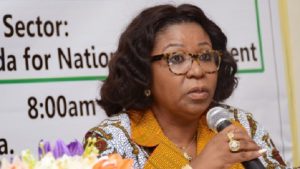The Federal Government of Nigeria on Wednesday, May 17, 2023, pledged its commitment to build resilience and sustainability of Niger Basin to promote livelihood support for countries benefiting from its resources.

This was the thrust of the National Workshop on the “Establishment and Operationalisation of the Regional Climate Change Adaptation Fund and Payments for Environmental Services (RCCAF/PES) Mechanism” in Abuja.
The Permanent Secretary, Federal Ministry of Water Resources, Dr Didi Walson-Jack, said that Niger Basin was one of the trans-boundary waters that should be protected, adding it is a huge source of economic growth and sustainability for member countries.
According to her, promoting cooperation among member countries and ensuring integrated development of the basin and its ecosystem cannot be effectively done without availability of funds.
Walson-Jack expressed worry over the non-payment of members’ contributions, saying that such delay was limiting activities of the Niger Basin Authority (NBA).
She stressed the need for member countries to effectively and efficiently contribute to the financing of NBA activities to safeguard and preserve the basin’s ecosystem and natural resources.
“It is important to note that RCCAF is in line with the fourth principle of integrated water resources management, which states that ‘Water has an economic value in all its competing uses and should be recognised as both an economic and social good’.
“It should be noted that NBA had already carried out and validated a study on autonomous and sustainable financing which resulted in the definition of five financing mechanisms adopted by the Basin’s high Authorities.
“These financing mechanisms are an integral part of the Niger Basin Water Charter and its Annexes and the RCCAF/PES falls within this approach,” Walson-Jack said.
Also, Mr Mukaila Babarinde, the Coordinator, NBA National Focal Structure, said NBA’s main mandate was to sustainably manage the Niger Basin ecosystems.
Babarinde said this would be done through integrated management of water resources and the enhancement of the living conditions and prosperity of the population.
“The focus of NBA, therefore, is the preservation of the Basin’s ecosystems, development of socioeconomic infrastructure and capacity building of actors within the Basin.
“It is also in creating an environment for peaceful coexistence among member countries,” he said.
Babarinde noted that NBA had proposed the establishment of the RCCAF/PES mechanism as a means to sustainably finance its activities.
Earlier, Mrs Christine Gbedji, RCCAF/PES Chairperson, said floods, droughts and climate variability promoting climate change, were more frequent and becoming a reality in the basin.
Gbedji said that continuous and accelerated degradation of the natural resources of the Niger Basin was increasingly noticeable due to inappropriate human activities and changing climatic conditions.
“The socioeconomic activities of our countries are strongly linked to or dependent on the Niger River’s resources, especially water resources.
“It is more than necessary to ensure the sustainability of these resources for the economies of our countries and future generations as this dependence is accentuated with climate change,” she said.
The chairperson, however, called for innovative financing sources for sustainable investments and development of the Niger River Basin.
“Africa must take charge of itself; our NBA countries must be aware that development is endogenous and that we need a collective leap forward in order to stop being satisfied with the little assistance our partners provide us with.”
The continued dwindling of water flows observed over several decades is said to have contributed to the widespread degradation of natural resources, the worsening of water and wind erosion and the silting of the Niger River.
However, with the introduction of the Programme for Integrated Development and Adaptation to Climate Change in the Niger Basin (PIDACC), such efforts have seen an increased resilience of people and ecosystems of the Niger River Basin.
The NBA was created in November 1964 and has nine member countries namely Benin, Burkina Faso, Cote d’Ivoire, Cameroon, Guinea, Mali, Niger, Nigeria and Chad.
The headquarters of the authority is located in Niamey, Niger Republic.
By Tosin Kolade
